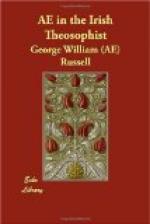There waits brooding in this isle a great destiny, and to accomplish it we must have freedom of thought. That is the greatest of our needs, for thought is the lightning-conductor between the heaven-world and earth. We want fearless advocates who will not be turned aside from their course by laughter or by threats. Why is it that the spirit of daring, imaginative enquiry is so dead here? An incubus of spiritual fear seems to beset men women so that they think, if they turn from the beaten track seeking the true, they shall meet, not the divine with outstretched hands, but a demon; that the reward for their search will not be joy or power but enduring pain. How the old bard swept away such fears! “If thy God were good,” said Ossian, “he would call Finn into his dun.” Yes, the heroic heart is dear to the heroic heart. I would back the intuition of an honest soul for truth against piled-up centuries of theology. But this high spirit is stifled everywhere by a dull infallibility which is yet unsuccessful, on its own part, in awakening inspiration; and, in the absence of original though, we pick over the bones of dead movements, we discuss the personalities of the past, but no one asks the secrets of life or of death. There are despotic hands in politics, in religion, in education, strangling any attempt at freedom. Of the one institution which might naturally be supposed to be the home of great ideas we can only say, reversing the famous eulogy on Oxford, it has never given itself to any national hero or cause, but always to the Philistine.
With the young men who throng the literary societies the intellectual future of Ireland rests. In them are our future leaders. Out of these as from a fountain will spring—what? Will we have another generation of Irishmen at the same level as today, with everything in a state of childhood, boyish patriotism, boyish ideals, boyish humour? Or will they assimilate the aged thought of the world and apply it to the needs of their own land? I remember reading somewhere a description by Turgenieff of his contemporaries as a young man; how they sat in garrets, drinking execrably bad coffee or tea. But what thoughts! They talked of God, of humanity, of Holy Russia; and out of such groups of young men, out of their discussions, emanated that vast unrest which has troubled Europe and will trouble it still more. Here no questions are asked and no answers are received. There is a pitiful, blind struggle for a nationality whose ideas are not definitely conceived. What is the ideal of Ireland as a nation? It drifts from mind to mind, a phantom thought lacking a spirit, but a spirit which will surely incarnate. Perhaps some of our old heroes may return. Already it seems as if one had been here; a sombre Titan earlier awakened than the rest who passed before us, and sounded the rallying note of our race before he staggered to his tragic close. Others of brighter thought




